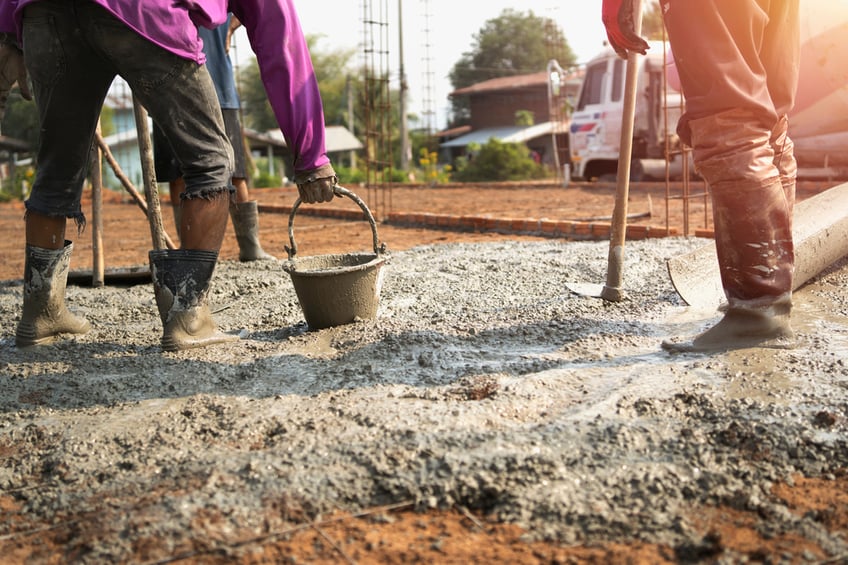Concrete Contractors Colorado Springs are responsible for a wide range of construction projects that involve concrete. They work closely with architects, engineers, and construction managers to ensure that their work meets all specifications and regulations.
Choosing the right contractor is important for any project. A good start is to make a list of potential contractors. Then, compare them based on the following criteria:
Concrete is a versatile material that is used in construction for a number of different purposes. If you are looking to build a home or a commercial building from concrete, it is important that you work with an experienced contractor who has the knowledge and skills to get the job done right. This can ensure that the finished product will be durable and safe for people to use. It is also important to find a contractor who has a history of working on projects similar to yours and can provide references that will show you the quality of their work.
A good concrete contractor will be able to work quickly and efficiently while maintaining the highest level of quality. They will have a team of workers and specialized equipment to ensure that the project is completed on time and within budget. They will also be familiar with the process of obtaining necessary permits for commercial construction projects, which can save you a lot of hassle and headaches.
When you are choosing a concrete contractor for your project, make sure to ask about their experience and past projects. You can also check online reviews to see what other customers have said about their services. If you are unsure about which concrete contractor to choose, consider asking friends and family for recommendations. They will be able to give you an honest opinion based on their personal experiences and the quality of the work that was performed.
Concrete contractors can handle a variety of different types of projects, from driveways to sidewalks and even foundations. They can also help with site preparation by making sure that rocks, debris, trees, garbage, and other materials are removed before pouring the concrete. They can also help with forming and placing concrete and can apply concrete finishes, such as stamped or colored concrete, to the concrete for an attractive look. They may also be able to assist with installing reinforcement bars and other materials that are needed for the strength of the concrete. They may also be able to recommend different types of concrete, such as precast slabs or recycled concrete, depending on the project.
Licensing
Concrete contractors must be licensed in order to legally operate their businesses. This means that they must meet a minimum age requirement (which varies by state), pass a written test, and show that their business is financially solvent, usually by putting money aside in a bond. In addition, they must also meet local requirements, such as obtaining a building permit or zoning approval for their business location.
Licensing requirements vary by state, but they generally require a certain amount of experience working with concrete and a background check. In addition, most states require concrete contractors to carry liability insurance and workers’ compensation coverage. Obtaining the appropriate licensing can be a lengthy process. It is best to consult with the state’s labor and industry department for more information.
The type of license required to work with concrete varies by state, but in most cases, it is necessary to have at least a general contractor’s license. In some states, there is a special license for concrete contractors; in others, it is included as part of the general contractor’s license.
Most concrete contractors must be bonded in order to work on construction projects. The bond amount varies by city, and applicants must submit an application, proof of identity, and insurance coverage. Generally, the applicant must also sign a statement confirming that they understand their obligation to pay any claims against them made by project owners or other contractors.
Other licensing requirements vary by state, but they typically include having a minimum number of years in the trade and passing a written exam. Many states also require criminal background checks. The criminal history is assessed on a case-by-case basis to determine if the convictions are relevant and whether they would affect the ability of a contractor to perform the job in a responsible and safe manner.
In addition to securing the right licenses, it’s important for concrete contractors to stay up-to-date on the latest news in the industry. Keeping up with new trends can help them improve their services and ensure that they are providing customers with the best possible experience.
Insurance
Concrete contractors rely on proper insurance coverage to help protect themselves and their clients. This type of coverage can help pay for legal fees and damages should an accident occur. Without adequate insurance coverage, a simple lawsuit could bankrupt your business and ruin all of the hard work you’ve put into it.
A concrete contractor’s insurance program should include general liability and commercial property coverage. This insurance offers protection in the event that you damage someone’s property while working on a jobsite or when a customer is injured by faulty workmanship. This type of insurance also covers the cost of repairing or replacing damaged equipment, supplies, and inventory. Commercial property insurance also includes coverage for rented space such as an office building or warehouse where tools and equipment are stored.
Workers’ compensation insurance is another essential policy for concrete contractors. This type of coverage pays for medical expenses and lost wages if an employee is injured on the job site. It also helps pay for legal costs if an employee sues the business over a workplace-related injury. Most states require employers to carry workers’ compensation insurance, so check your state’s requirements before hiring employees.
Your concrete contractor’s business may also need a commercial auto insurance policy. This coverage will protect your company’s vehicles, whether they are owned by you or your employees. It can also cover hired and non-owned vehicles that your employees might use on the job, as well as coverage for rented or borrowed vehicles.
Finally, your business will likely need a cyber insurance policy. This coverage can help your concrete business recover from a data breach or loss of electronic documents. This type of insurance can also help you comply with government regulations for keeping sensitive information private.
There are many options for insurance coverage for concrete contractors, and it’s important to work with an independent agent that understands your risks and can provide you with multiple quotes. An agent that specializes in insurance for small businesses can also help you decide which types of coverage and policy limits are right for your business.
Customer Service
A concrete contractor should have excellent customer service skills. They need to be able to answer any questions that a potential client might have about the job that they’re hiring them for. This can include how long it will take to finish the project, the price of the job, and other details. They should also be able to provide references for past work that they’ve done. This is a great way to see what other people have thought of your work and can help you make a decision.
It’s important for a concrete company to have a good balance between operating efficiently and providing quality customer service. When companies put too much emphasis on efficiency, the customer experience can suffer. In order to ensure that the company provides high-quality customer service, it’s essential for them to operate in a market where customers have choices and are willing to pay for them.
One of the most effective ways to generate new business for a concrete company is to develop relationships with local suppliers. This could be hardware stores, big box stores, or even small mom-and-pop shops in the neighborhood. By establishing these partnerships, the concrete company will be able to generate a steady stream of leads from customers who are looking for a reliable provider. The company should focus on providing exceptional customer service to these customers in order to build trust and establish a strong reputation.
Lastly, the concrete company should have a team of dedicated employees. This can include general managers, project supervisors, and skilled laborers who are able to handle various aspects of the business, including marketing, management, accounting, and job estimation. This is important because a concrete company takes a lot of work to run, and there are many different aspects of the business that need to be managed by qualified employees.
The best concrete contractors have years of experience in the industry. They are able to use their knowledge and techniques to complete projects on time and within budget. These professionals are also able to create unique designs that add value and beauty to a home or commercial space. They can even spruce up existing concrete surfaces by using staining and stenciling techniques.

